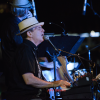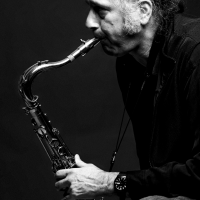Home » Jazz Musicians » Horace Silver
Horace Silver

When Horace Silver once wrote out his rules for musical composition (in the liner notes to the 1968 record, Serenade to a Soul Sister), he expounded on the importance of "meaningful simplicity." The pianist could have just as easily been describing his own life. For more than fifty years, Silver has simply written some of the most enduring tunes in jazz while performing them in a distinctively personal style. It's all been straight forward enough, while decades of incredible experiences have provided the meaning.
Silver was born in Norwalk, Connecticut on September 2, 1928. His father had immigrated to the United States from Cape Verde—-and that island nation's Portuguese influences would play a big part in Silver's own music later on. When Silver was a teenager, he began playing both piano and saxophone while he listened to everything from boogie-woogie and blues to such modern musicians as Bud Powell and Thelonious Monk. As Silver's piano trio was working in Hartford, Connecticut, the group received saxophonist Stan Getz's attention in 1950. The saxophonist brought the band on the road and recorded three of Silver's compositions.
In 1951, Silver moved to New York City where he accompanied saxophonists Coleman Hawkins, Lester Young and many other legends. In the following year, he met the executives at Blue Note while working as a sideman for saxophonist Lou Donaldson. This meeting led to Silver signing with the label where he would remain until 1980. He also collaborated with Art Blakey in forming the Jazz Messengers during the early 1950s (which Blakey would continue to lead after Silver formed his own quintet in 1956).
During these years, Silver helped create the rhythmically forceful branch of jazz known as "hard bop" (chronicled in David H. Rosenthal's 1992 book, Hard Bop: Jazz and Black Music, 1955-1965). He based much of his own writing on blues and gospel—-the latter is particularly prominent on one of his biggest tunes, "The Preacher." While his compositions at this time featured surprising tempo shifts and a range of melodic ideas, they immediately caught the attention of a wide audience. Silver's own piano playing easily shifted from aggressively percussive to lushly romantic within just a few bars. At the same time, his sharp use of repetition was funky even before that word could be used in polite company. Along with Silver's own work, his bands often featured such rising jazz stars as saxophonists Junior Cook and Hank Mobley, trumpeter Blue Mitchell, and drummer Louis Hayes. Some of his key albums from this period included Horace Silver Trio (1953), Horace Silver and the Jazz Messengers (1955), Six Pieces of Silver (1956) and Blowin' The Blues Away (1959), which includes his famous, "Sister Sadie." He also combined jazz with a sassy take on pop through the 1961 hit, "Filthy McNasty."
Read moreTags
Stylings of Silver, Nods to Nica, Quartet of Trios

by David Brown
This week, our featured artist is pianist/composer Horace Silver. We'll check out a number of his compositions as performed by Ran Blake, Shirley Scott , Tommy Flanagan, Gigi Gryce and Silver himself. From there we will check out works written in homage to the Baroness Panonnica de Koenigswarter--known as Nica--a patron, supporter and friend to many musicians in golden age of jazz. We'll also hear recent works form the Kris Davis Trio, John Chin Trio, Anna Webber Trio, Tyshawn Sorey ...
Continue ReadingDesigning Jazz: The Iconic Album Covers of Reid Miles

by Kristine England
Blue Note Records has embodied the best jazz has to offer for over 80 years. With a catalog of greats, from Horace Silver, Miles Davis, John Coltrane, Lee Morgan, Hank Mobley, Art Blakey, Herbie Hancock, Dexter Gordon and countless others from the bop and post-bop eras, to the funky recordings that hip-hop artists have repeatedly sampled, to its current roster, the label remains at the forefront of the genre. It wasn't just the music that set the label ...
Continue ReadingThe Mount Rushmore of Hard Bop

by Michael Ricci
Member votes were tabulated and the top four vote-getters represent the Mount Rushmore of hard bop. Thank you to everyone who voted. 1Horace Silver2Art Blakey3Lee Morgan4Hank Mobley5John Coltrane6Miles Davis7Sonny Rollins8Freddie Hubbard9Cannonball Adderley10Clifford Brown11Wayne Shorter12Thelonious Monk13Max Roach14Charlie Parker15Dexter Gordon16Dizzy Gillespie17Charles Mingus18Kenny Dorham19Jackie McLean20Bobby Timmons21Benny Golson22Joe Henderson23Curtis Fuller24Paul Chambers25McCoy Tyner26Herbie Hancock27Jimmy Smith28Bud Powell29Donald Byrd30Philly Joe Jones31Sonny Clark32Grant Green33Bill Evans34Red Garland35Wes Montgomery36Ron Carter37Art Farmer38Art Pepper39Bobby Hutcherson40Lou Donaldson41Art Blakey and the Jazz Messengers42Duke Ellington43Billie Holiday44Ahmad Jamal45Eric Dolphy46Cedar Walton47Michael Brecker48Phil Woods49Roy Hargrove50Elvin ...
Continue ReadingHorace Silver: Live New York Revisited

by Stefano Merighi
Benchè il profilo artistico di Horace Silver sia preso a modello in modo paradigmatico per definire lo stile hard bop nel jazz moderno, è altresì interessante notare come Silver, sin dalle sue prime uscite, abbia sempre cercato di evitare gli schemi predeterminati che soprattutto le etichette discografiche cercavano di replicare dopo aver trovato la formula del successo. Ad esempio, Silver non amava le scalette miste, quelle cioè che infilavano d'abitudine uno standard proveniente da Tin Pan Alley all'interno di un ...
Continue ReadingA Silver Set, A Bit of Brubeck + Recent Releases

by David Brown
This week, a welcome adventure in music! Jazz is Dead, A bluesy Horace Silver set, a bit of Brubeck (pre-classic quartet) plus recent releases form Daniel Carter, Billy Drummond, Sasha Berliner, Walt Weiskopf, and more. Playlist Thelonious Monk “Esistrophy (Theme)" from Live at the It Club-Complete (Columbia) 00:30 Ali Shaheed Muhammad & Adrian Younge “Summer Solstice" from Katalyst—Jazz Is Dead 13 (Jazz Is Dead ) 02:00 Yusef Lateef “In The Evening" from The Complete Yusef Lateef (Atlantic ) ...
Continue ReadingHorace Silver: His Only Mistake Was To Smile

by Chris May
In his sleeve note for the audio restored Horace Silver album Live New York Revisited (ezz-thetics, 2022), British writer Brian Morton cut to the chase. “[Silver]'s only mistake," he wrote, “was to smile while he was playing... a challenge to the notion that jazz should be deadly serious and played with a pained rictus." From a historical point of view, Silver's cheerful face--his natural, default expression on stage—has done him no favours. It has fostered a perception ...
Continue ReadingHorace Silver Quintet: Live New York Revisited

by Chris May
This fabulous album, recorded during three New York club engagements in 1964, 1965 and 1966, ranks among the finest in the pianist/composer's illustrious catalogue. There are several things going for it: the quality and shared intentionality of the two, slightly different, lineups; the choice of material and its careful sequencing; the vibrancy of the performances, which is enough to practically raise the dead; and the quality of the CD mastering by the ezz-thetics label's sonic jedi Michael Brändli, whose work ...
Continue ReadingPerfection: Horace Silve's The Back Beat

Source:
JazzWax by Marc Myers
Like Bill Evans, Horace Silver was unlike any other jazz pianist. The forefather of funk, Silver was brilliant at chord voicings, rhythm, original melodies and, most of all, harmony. He also was one of the originators of hard bop in 1952. Discovered in Hartford, Ct., by Stan Getz in 1950, Silver led a quintet for much of his career, starting in 1956. The format was perfect for expressing his dynamic and exotic originals. Melodies were catchy and the horns were ...
read more
Jazz Musician of the Day: Horace Silver

Source:
Michael Ricci
All About Jazz is celebrating Horace Silver's birthday today!
When Horace Silver once wrote out his rules for musical composition (in the liner notes to the 1968 record, Serenade to a Soul Sister), he expounded on the importance of “meaningful simplicity." The pianist could have just as easily been describing his own life. For more than fifty years, Silver has simply written some of the most enduring tunes in jazz while performing them in a distinctively personal style. It's all ...
read more
Jazz Musician of the Day: Horace Silver

Source:
Michael Ricci
All About Jazz is celebrating Horace Silver's birthday today!
When Horace Silver once wrote out his rules for musical composition (in the liner notes to the 1968 record, Serenade to a Soul Sister), he expounded on the importance of “meaningful simplicity." The pianist could have just as easily been describing his own life. For more than fifty years, Silver has simply written some of the most enduring tunes in jazz while performing them in a distinctively personal style. It's all ...
read more
Backgrounder: Horace Silver, 'Horace-Scope'

Source:
JazzWax by Marc Myers
One of my favorite Horace Silver albums is Horace-Scope. Recorded on July 8 and 9 in 1960, the Horace Silver Quintet at the time consisted of Horace Silver on piano, Blue Mitchell on trumpet, Junior Cook on tenor saxophone, Gene Taylor on bass and Roy Brooks on drums. The tracks are Strollin', Where You At?, Don Newey's Without You, Horace-Scope, Yeah!, Me and My Baby and Nica's Dream. Here's the full album that you can listen to without ads or ...
read more
Horace Silver: 'Blowin' the Blues Away'

Source:
JazzWax by Marc Myers
I'm hard-pressed to think of a post-war jazz pianist-composer who was as electrifying and addictive as Horace Silver. Thelonious Monk and Bill Evans are certainly in the pantheon of exceptional player-songwriters. But Silver was really in a class by himself. In addition to being a gorgeous balladeer and a lyrical hard-bop pioneer, he was a penetrating keyboardist who favored intriguing sweet-and-sour chord voicings, and many of his catchy songs are now standards. Most of all, Silver was first to develop ...
read more
Color Videos: Horace Silver Quintet

Source:
JazzWax by Marc Myers
While writing yesterday, I fell into a Horace Silver groove. Funk meets hard bop, with a twist of Silver's spectacular rhythmic counterpoint and chord voicings. Which sent me onto YouTube to see what was new with Horace. There, I found a bunch of videos that had been colorized. Now you can see and hear them, too. Here are seven Horace Silver color videos: Here's Nutville and Song for My Father, colorized on the Danish TV show Jazz Omkring Midnat, in ...
read more
Jazz Musician of the Day: Horace Silver

Source:
Michael Ricci
All About Jazz is celebrating Horace Silver's birthday today!
When Horace Silver once wrote out his rules for musical composition (in the liner notes to the 1968 record, Serenade to a Soul Sister), he expounded on the importance of “meaningful simplicity." The pianist could have just as easily been describing his own life. For more than fifty years, Silver has simply written some of the most enduring tunes in jazz while performing them in a distinctively personal style. It's all ...
read more
Jazz Musician of the Day: Horace Silver

Source:
Michael Ricci
All About Jazz is celebrating Horace Silver's birthday today!
When Horace Silver once wrote out his rules for musical composition (in the liner notes to the 1968 record, Serenade to a Soul Sister), he expounded on the importance of “meaningful simplicity." The pianist could have just as easily been describing his own life. For more than fifty years, Silver has simply written some of the most enduring tunes in jazz while performing them in a distinctively personal style. It's all ...
read more
Jazz Musician of the Day: Horace Silver

Source:
Michael Ricci
All About Jazz is celebrating Horace Silver's birthday today!
When Horace Silver once wrote out his rules for musical composition (in the liner notes to the 1968 record, Serenade to a Soul Sister), he expounded on the importance of “meaningful simplicity." The pianist could have just as easily been describing his own life. For more than fifty years, Silver has simply written some of the most enduring tunes in jazz while performing them in a distinctively personal style... Read more. ...
read more
Perfect Album: Horace-Scope

Source:
JazzWax by Marc Myers
Two of the most dominant and successful hard bop groups of the 1950s were Art Blakey and the Jazz Messengers and the Horace Silver Quintet. One wasn't better than the other. Their differences were a matter of flavors and hues. Blakey's group tended to be mightier and bluesier. Silver was funkier and more lyrical, largely because he composed and arranged many of the songs with his jaunty bop feel. Of Silver's vast catalog of exceptional albums, Horace-Scope has always been ...
read more


































































.jpg)

















